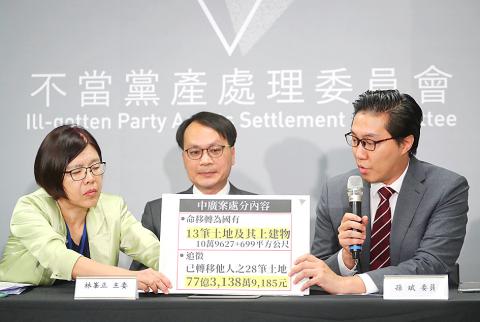The Ill-gotten Party Assets Settlement Committee yesterday declared Broadcasting Corp of China (BCC, 中廣) an affiliate of the Chinese Nationalist Party (KMT), ordering it to relinquish 109,627m2 of land to the state and pay NT$7.731 billion (US$249.283 million) in compensation.
The committee said that the finances, business and personnel of the company had been effectively under the control of the KMT until 2016, when it, through party-controlled Hua Hsia Investment Holding Co (華夏投資), sold 96.95 percent of BCC shares under its control at a steep discount to Hao Ting Co (好聽), Yueh Yueh Co (悅悅), Boyinyuan Co (播音員) and Guangbojen Co (廣播人).
The committee said that BCC’s ill-gotten assets could be split into two major categories: land and assets appropriated from now-defunct Taiwan Hoso Kyokai and those purchased with government funding.

Photo: CNA
The committee ordered BCC to transfer ownership of a broadcasting unit and a former broadcasting bureau building in Chiayi County’s Minsyong Township (民雄) and a broadcasting unit on Toad Mountain (蟾蜍山) in New Taipei City’s Jingmei District (景美) — totaling 109,627m2 of land and 699m2 of building space — to the state, per the Act Governing the Handling of Illegal Assets by Political Parties and Their Affiliate Organizations (政黨及其附隨組織不當取得財產處理條例).
It also demanded that BCC compensate the government for assets acquired via ill-gotten means that have already been transferred to a third party or requisitioned by the government.
Among such assets is Taipei’s luxury residential complex The Palace (帝寶).
The company should transfer ownership of the properties and pay the government within 30 days of receiving official notice, the committee said.
However, as the radio frequencies that BCC operates on are within the jurisdiction of the National Communications Commission, they were not considered, it added.

Chinese Nationalist Party (KMT) Chairman Eric Chu (朱立倫), spokeswoman Yang Chih-yu (楊智伃) and Legislator Hsieh Lung-chieh (謝龍介) would be summoned by police for questioning for leading an illegal assembly on Thursday evening last week, Minister of the Interior Liu Shyh-fang (劉世芳) said today. The three KMT officials led an assembly outside the Taipei City Prosecutors’ Office, a restricted area where public assembly is not allowed, protesting the questioning of several KMT staff and searches of KMT headquarters and offices in a recall petition forgery case. Chu, Yang and Hsieh are all suspected of contravening the Assembly and Parade Act (集會遊行法) by holding

PRAISE: Japanese visitor Takashi Kubota said the Taiwanese temple architecture images showcased in the AI Art Gallery were the most impressive displays he saw Taiwan does not have an official pavilion at the World Expo in Osaka, Japan, because of its diplomatic predicament, but the government-backed Tech World pavilion is drawing interest with its unique recreations of works by Taiwanese artists. The pavilion features an artificial intelligence (AI)-based art gallery showcasing works of famous Taiwanese artists from the Japanese colonial period using innovative technologies. Among its main simulated displays are Eastern gouache paintings by Chen Chin (陳進), Lin Yu-shan (林玉山) and Kuo Hsueh-hu (郭雪湖), who were the three young Taiwanese painters selected for the East Asian Painting exhibition in 1927. Gouache is a water-based

Taiwan would welcome the return of Honduras as a diplomatic ally if its next president decides to make such a move, Minister of Foreign Affairs Lin Chia-lung (林佳龍) said yesterday. “Of course, we would welcome Honduras if they want to restore diplomatic ties with Taiwan after their elections,” Lin said at a meeting of the legislature’s Foreign Affairs and National Defense Committee, when asked to comment on statements made by two of the three Honduran presidential candidates during the presidential campaign in the Central American country. Taiwan is paying close attention to the region as a whole in the wake of a

OFF-TARGET: More than 30,000 participants were expected to take part in the Games next month, but only 6,550 foreign and 19,400 Taiwanese athletes have registered Taipei city councilors yesterday blasted the organizers of next month’s World Masters Games over sudden timetable and venue changes, which they said have caused thousands of participants to back out of the international sporting event, among other organizational issues. They also cited visa delays and political interference by China as reasons many foreign athletes are requesting refunds for the event, to be held from May 17 to 30. Jointly organized by the Taipei and New Taipei City governments, the games have been rocked by numerous controversies since preparations began in 2020. Taipei City Councilor Lin Yen-feng (林延鳳) said yesterday that new measures by